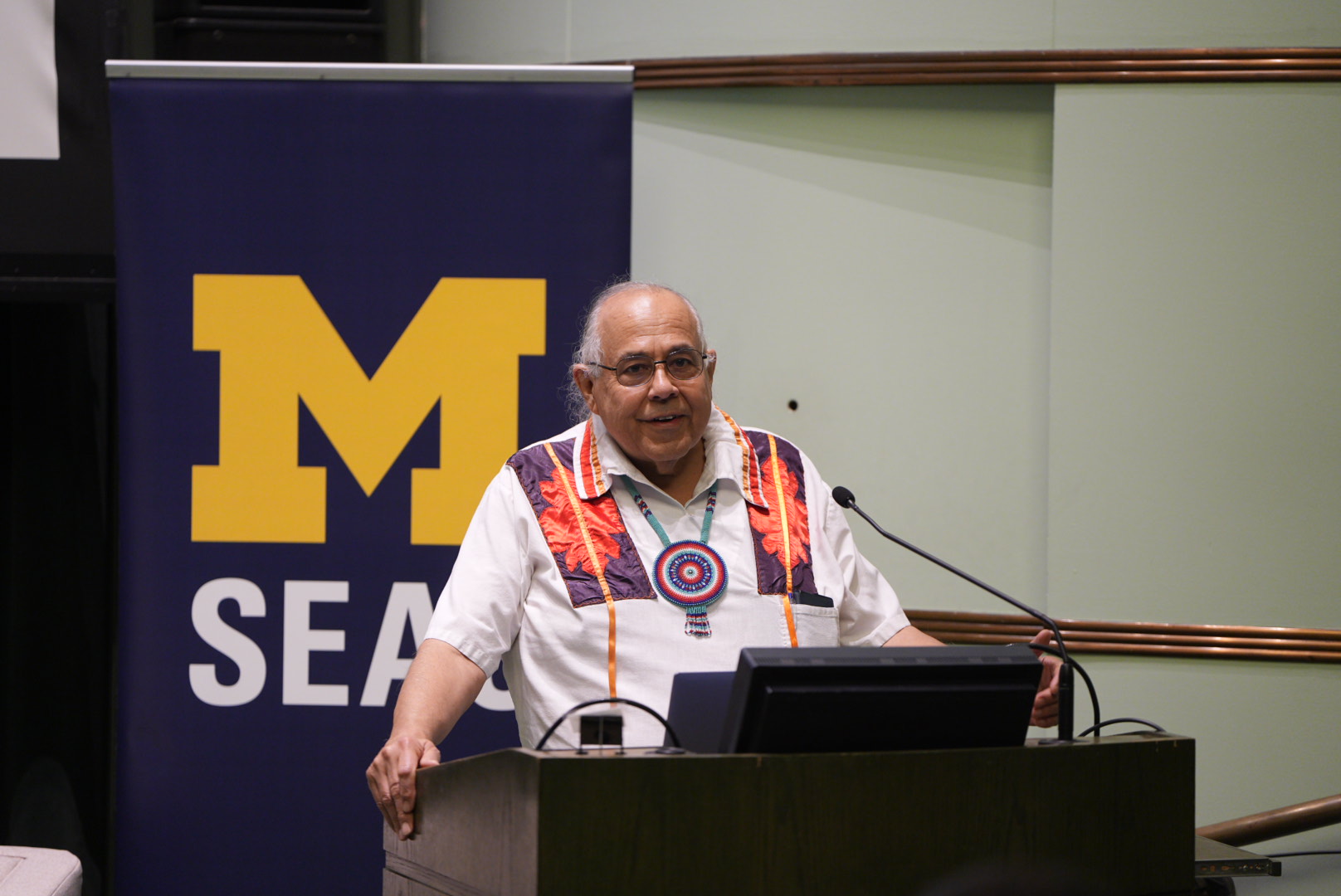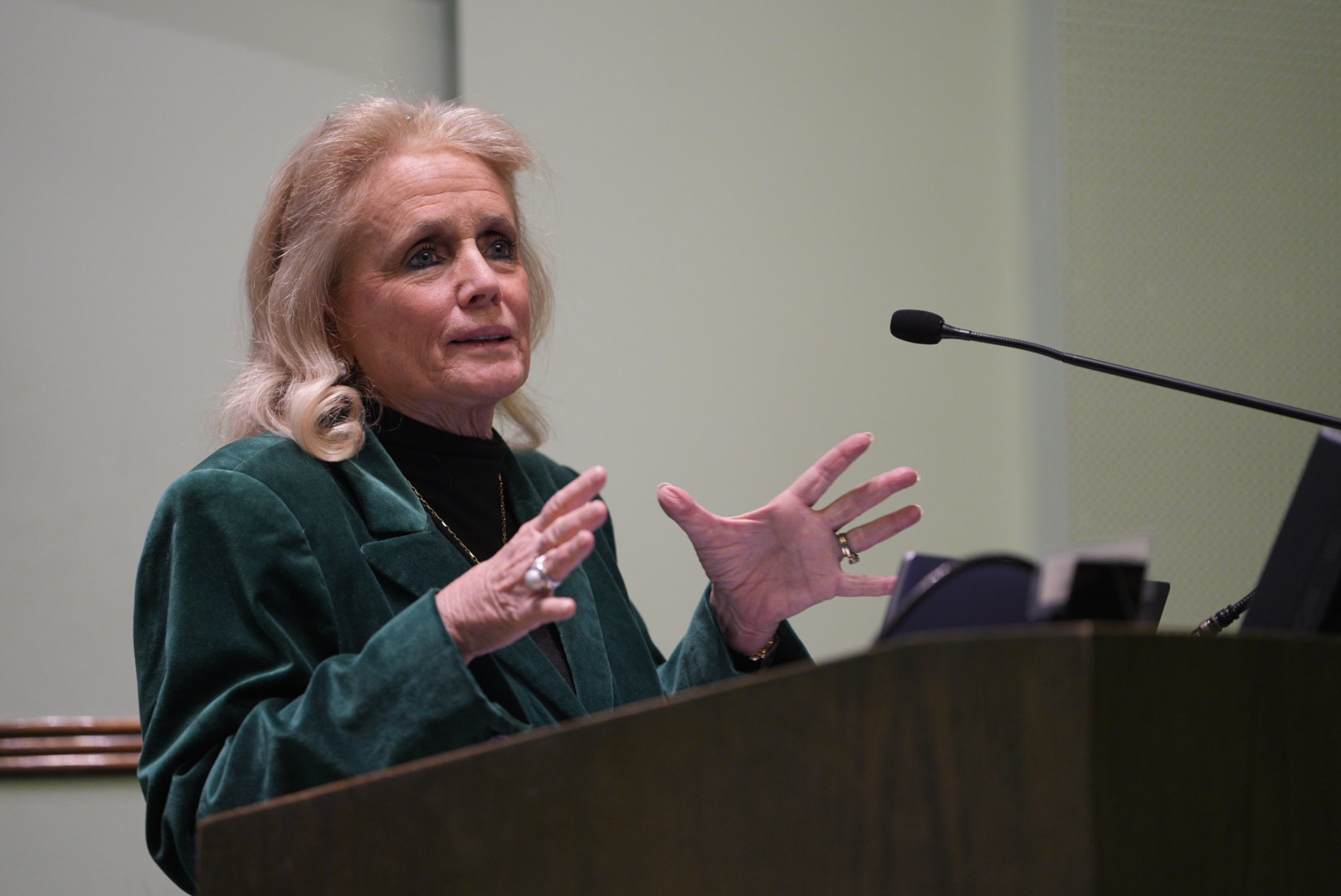
 back to all news
back to all news
Great Lakes Compact Symposium: Celebrating and reflecting on the compact at 15 years

The 2023 Great Lakes Compact Symposium, which took place on Friday, December 8, 2023, at the University of Michigan, was the first time that key negotiators of the Great Lakes–St. Lawrence River Basin Water Resources Compact came together to celebrate and reflect on the agreement which became state and federal law in 2008.
The need for a compact came when, twenty-five years ago, a Canadian company decided they could fill tanker ships with Great Lakes water to sell to countries with water shortages. Wanting to protect the lakes, the Great Lakes states, along with Ontario and Quebec, began the complex negotiations that would lead to the formal agreement detailing how they’d work together to manage as well as protect the Great Lakes.
The host of the symposium, David Naftzger, executive director of the Great Lakes and St. Lawrence Governors and Premiers, started the event with some remarks, then introduced University of Michigan School for Environment and Sustainability (SEAS) Associate Professor Drew Gronewold, who welcomed the audience and provided two guiding questions for the gathering, which were whether the compact could withhold the test of time as the extremes between water scarcity and abundance grow wider, and how students and scientists in the next 10-20 years will develop their understanding of the answer to that question.
Ian Stone, a second-year master’s student at SEAS, introduced Frank Ettawageshik, executive director of the United Tribes of Michigan. Ettawageshik explained how coming together with 185 tribes and nations led to the development and adoption of the Tribal and First Nations Great Lakes Water Accord in 2004, four years before the Great Lakes Compact was finalized in 2008. He said that it was the signing of the accord that finally brought Indigenous peoples into the compact negotiations and that, ever since, the collaboration has been ongoing and productive.

Photo credit: Nick Hagen Photography
Ettawageshik described the native world view of the Earth, and how its elements such as air, wind, fire and water are not things that are owned, but rather that humans have a relationship with and live with. He said this was an important perspective to bring to the compact negotiations, which officially acknowledged the importance of protecting the Great Lakes. “This is a shining example of getting together and working on an issue before there was an abject crisis. I think the rest of the world can learn from that, and I think it’s something that we need to do and we need to feel good about,” said Ettawageshik.
Vianey Rueda, a PhD student at SEAS, then introduced U.S. Representative Debbie Dingell, the keynote speaker who discussed the importance of protecting freshwater systems and the reasons why doing so is both essential and personal. She described growing up on the water, and how her late husband, Michigan Congressman John Dingell, was instrumental in the passage of the Clean Water Act in 1972.
Discussing the significance of the compact, Dingell said, “The compact is a testament to what is possible when we work together binationally and at every level of government to manage these waters responsibly. The compact recognizes that through sustainability we can foster economic growth and development while supporting those crucial conservation measures, and it recognizes the critical importance of public involvement in the management of our natural resources, incorporating the voices of impacted communities.”
Dingell emphasized the importance of ensuring the protection of the Great Lakes watershed, which holds 20% of the freshwater in the world, for the 100 million people in the region, and that every community has the right to have a say about their natural resources and how they are used, as well as having access to safe, clean water.

Photo credit: Nick Hagen Photography
The first of two panel discussions began after Dingell’s keynote. It was moderated by Peter Annin, director of the Mary Griggs Burke Center for Freshwater Innovation and author of "Great Lakes Water War." The panelists, all key negotiators of the compact, were Kate Bartter, executive director, Ohio State Sustainability Institute, former chief policy adviser to Gov. Taft of Ohio; David de Launay, chair of the board of directors and president, Ma'mo'weh Wii'soo'ka'tiwin Foundation, supporting the work of First Nations within Treaty 3 Territory (northwestern Ontario), former deputy minister of the Ontario provincial government; Todd Ambs, formerly of the Wisconsin Department of Natural Resources; and Jon Allan, academic and research program officer senior at U-M School for Environment and Sustainability, former member of the Compact Development Stakeholder Advisory Committee.
The panel discussion highlighted the magnitude of the undertaking, and the process of collaborating on the development of the document that would need approval and passage from each governmental body, including Congress and the Canadian Parliament.
The work took, “Over 100 in-person day-long and evening meetings, 400 conference calls, and 92 drafts,” said Ambs.
The second panel, moderated by Andy Buchsbaum, lecturer at the U-M Law School and former member of the Compact Development Stakeholder Advisory Committee, picked up the conversation in 2005, when the compact negotiation process was completed but had yet to go through the legislative chambers and get the consent of both the House and the Senate, and then a signature by President George W. Bush in 2008.
The panelists were Molly Flanagan, chief operating officer and vice president for programs at the Alliance for the Great Lakes, former program officer at The Joyce Foundation and staff member of the National Wildlife Federation and the Ohio Environmental Council; Peter Johnson, deputy director, Great Lakes St. Lawrence Governors and Premiers; and Shaili Pfeiffer, natural resources staff specialist with the Wisconsin Department of Natural Resources Bureau of Drinking Water and Groundwater Water Use Section.
After the panels, Liesl Eichler Clark, director of climate action engagement at U-M SEAS and former director of the Michigan Department of Environment, Great Lakes, and Energy, closed the event with a talk about today’s compact and a forward look into some challenges that lie ahead in the future. Clark was working with former Michigan Governor Jennifer Granholm at the time the compact was being written and said it was an “interesting and a very fascinating time to watch these conversations about our water which is so critical to Michiganders as we’ve heard here today.”

